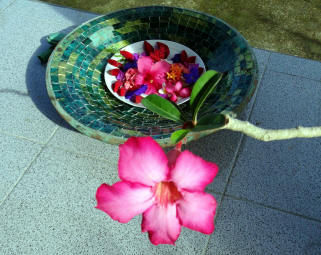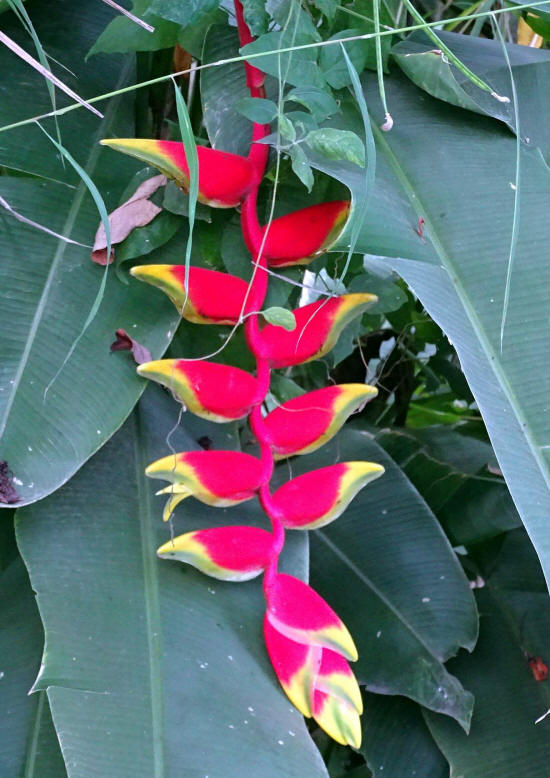Star Date: Feb 2018
Bali
Hello Dear Family & Friends!
“Rahajeng Semeng.”
(Good morning – Balinese)
“Selamat pagi”
(Good morning – Bahasa Indonesia)

“Let it go. Trust. Enjoy your life! That’s why you are here!”
Thousands of fireflies, kunang kunang, the rice fields were alive with an other-worldly pulse. Ecstatic at the appearance of the ‘Super Moon’ after hiding behind rain clouds for 2 nights, all of God’s Creation came alive. The skies cleared, the stars shone, the moon in all its super glory was dressed in a delicate lacy luna corona defying description. Frogs, crickets, toads, bugs joined the chorus. A chorus singing pure joy. A chorus singing pure Love. That is the key to the wonder of the Universe. That’s all there is. Simple. All else is an illusion. Transmute disparaging energy into a reality that defies words. Our purpose in life is to speak to this truth. To live in this truth. To share this truth. Be this truth. Let everything else go. Trust. Live in the internal essence, not react to the external illusion. Let our internal peace shine to those around us. Stay in the Joy and Love. Live from In to Out!
I woke up suddenly, the full moon shining into our room, flooding it with a heavenly brilliance. Walking out on the front terrace the Super Moon, largest in decades, was displayed in all its glory. All of creation was rejoicing in the beauty. My Mom had said to me over 50 years ago when I first set out to explore the world, “You will always be in my heart. Think of me when you see the moon, for we are both looking at the same moon, no matter how far apart we are.”
Now, thinking of my dear Mom, I distinctly heard in that spunky voice of hers, “You should see the moon from up here!” Yes we are all connected. Trust. All is one. All is well.
“Tat Tram Asi” (Balinese)
“Tat tvam asi” (Sanskrit)
I am you,
You are me.
This powerful Hindu philosophy focuses on the essence of what it is to be human. There is no separating Balinese religion from their everyday life. It is all interwoven in a colorful display of rituals and ceremonies. This contented way of life has been evolving and growing for centuries.
Out of over 18,000 islands of Indonesia, the world’s largest Islamic country, Bali is the only island where Hinduism is the predominant religion. Original Balinese fled nearby Java and established a unique culture, molded by the high castes and artisans arriving on the shores. Inhabitants were made to blend into the new society and a mixture of old and new traditions combined. Hinduism can be traced to the 8th through15th centuries when it was gradually accepted into practice. During this time it incorporated many of its older Balinese beliefs and rituals such as animism* and ancestor worship. Today’s religion is officially called Agama Hindu Dharma. It also known by a few other names, especially Agama Tirta meaning ‘religion of holy water’ which is an important part of many of the religious rituals.
The Balinese think of the universe as a well ordered configuration, where everything has its place. This includes gods, people, and demons each with their allotted place in the universe. There is a duality of nature, high and low, right and left, day and night, clean and unclean and especially good and evil. The yin and yang of life. Humans are caught between these opposing forces.
Bali has adopted the back and white checked fabric as a symbol of light and dark, good and evil. You will find this fabric draped on statues of deities and gods during religious festivals. It is also worn during religious ceremonies and during performances of epic ancient stories from the Mahabharata passed down through centuries.
It is believed the gods represent order and demons disorder. The deities (dewa and batara) reside on the tops of mountains along with deified ancestors and these deities give life to humans and the world, while the demons (bhuta and kala) who live under the sea seek humanity’s destruction. In the Balinese religion deities of fertility and the natural world and deified ancestors are worshiped alongside the Hindu trinity of Wisnu, Brahman, and Siwa. The divine is Sanghyang Widi Wasa, all other gods are thought to be mere manifestations of him.
Offerings must be made thanking the gods for their bounty. If they are not shown respect and thanks they may punish humans with volcanic eruptions, earthquakes and epidemics which will destroy what humans have received from the gods. These perils are reminders of their duty to the gods.
Offerings (banten)to the gods are placed high on alters or sacred areas of the temples. They consist of various items, always beautiful and sprinkled three times per day with holy water. Often the daily offerings are made with a palm leaf folded into a container with flowers, rice, salt and sometime fruits. Most offerings are made by women using plant materials. Offerings by men use meat and represent the animal kingdom. The ornate large offerings (Gebogan) are used for special religious ceremonies.
Once these offerings have been blessed and received by the gods, they may be used by the people. During the blessing incense is used to carry the essence of the offerings up to the heavens. The tall offerings (Gebogan) with luscious fruits, other foods and beautiful flowers is then taken home and used for a festival dinner. It is common today to see women carrying their offerings in covered baskets on their heads heading to the temple, then later this is used for the family’s dinner.
When visiting an elaborate funeral in Sulawesi, where many buffaloes were slaughtered (33), it was good to see that the meat was distributed to well wishers in buckets. A sort of ‘take away’. Nothing much goes to waste in Asia.
We went off, with good friend Barbara visiting us from Sumatra, to explore a couple of holy sites with Balinese pilgrims performing ceremonies at our side:
The Elephant Cave, Goa Gajah, and
Tirta Empul – Holy Spring were worth the trip. Both within 1 hour of Ubud it can be a half day trip (300,000rp). The forest paths around the Elephant Cave were lush and welcoming and we certainly washed away many ailments and sins in the holy waters, along with hundreds of devout Balinese!
Nyepi, Day of Silence. On the Eve of Nyepi, Pengrupukan Ceremony is to invite all the evil spirits to occupy the ogoh ogohs and once collected the effigies are burned – thus destroying the evil spirits. Ogoh-ogoh are statues built for the Ngrupuk parade, which takes place on the eve of Nyepi day. Ogoh-ogohs normally have form of mythological beings, mostly demons.
The main purpose of the making of Ogoh-ogoh is the purification of the natural environment of any spiritual pollutants emitted from the activities of living beings (especially humans). Philosophically, civilized men are required to manage the natural resources without damaging the environment itself.
Aside from being the symbol of Bhuta-Kala, Ogoh-ogoh is considered a symbol of modes of nature that form the malicious characters of living beings. Each village usually build one Ogoh-ogoh mainly built by each village’s Seka Truna Truni (Balinese village’s youth organization), but often some smaller ogoh-ogoh also built by groups of children around the village. Some artist also usually build one. After being paraded on a convoy around the town, finally it is burnt to ashes in a cemetery as a symbol of self-purification.
During the procession, the Ogoh-ogoh is rotated counter-clockwise three times. This act is done at every T-junction and crossroad of the village. Rotating the effigies during the cremational parade and the eve of Nyepi represents the contact of the bodies with the spirits. It is intended to bewilder the evil spirits so that they go away and cease harming human beings. The Ogoh-ogoh is a very recent addition to the Nyepi ceremonies, first appearing in Denpasar in the early 1980s. At that time, they were carefully monitored for any criticism of the Suharto regime.
All evil demons burned up, we were able to experience Nyepi. If you ever doubt the level of commitment to spirituality in Bali, simply look to their Nyepi festival. Probably no where else in the world is there an island which absolutely shuts down for spiritual reasons.
Before Nyepi, there is Melasti which involves an elaborate ceremony to burn effigies of evil monsters and cleanse the island. Then comes Nyepi, which is known as the day of silence to fool demons into thinking that the island is uninhabited, thus leaving Bali alone in peace for another year.
In most cultures where economic forces relentlessly shape our lifestyles, it is refreshing to see that in Bali, belief in the otherworldly takes precedence, even if it’s just for one day a year.
Observed from 6 a.m. until 6 a.m. the next morning, Nyepi is a day reserved for self-reflection, and as such, anything that might interfere with that purpose is restricted. The main restrictions are no lighting fires (and lights must be kept low); no working; no entertainment or pleasure; no traveling; and, for some, no talking or eating at all. The effect of these prohibitions is that Bali’s usually bustling streets and roads are empty, there is little or no noise from TVs and radios, and few signs of activity are seen even inside homes. The only people to be seen outdoors are the Pecalang, traditional security men who patrol the streets to ensure the prohibitions are being followed.
Although Nyepi is primarily a Hindu holiday, non-Hindu residents and tourists are not exempt from the restrictions. Although they are free to do as they wish inside their hotels, no one is allowed onto the beaches or streets, and the only airport in Bali remains closed for the entire day. The only exceptions granted are for emergency vehicles responding to life-threatening conditions and women about to give birth. [On the day after Nyepi, known as Ngembak Geni (Relighting the Fire), social activity picks up again quickly, as families and friends gather to ask forgiveness from one another, and to perform certain religious rituals together. Fires and electricity are allowed again, and cooking of food resumes.
The day is supposed to be spent in meditation and silence. And no cell phones or wifi reception – can you imagine?? In most other countries cell phone junkies would go through withdrawal. But out in the rice fields, in our little home outside of Ubud, not much changed. Without any outside noise Nature again ruled supreme as birds and butterflies danced on the breeze. Normally Bali is a beehive of activity and it is crucial to seek out the hidden lovely quiet spots in which to enjoy your visit. Silence everywhere. What a rare treat! The nighttime was absolute magic with complete darkness punctuated only with fireflies and a display of celestial stars unmatched in the Outback of Australia.
The cycle of life is displayed in the rice fields around us. The fields are plowed, water added, the gossiping ducks arrive to fertilize and rid the field of pests. The new seedlings are planted, they grow into the vibrant ‘new rice’ green. Time passes and kernels of rice start to form. Before you know it the now golden field is harvested. A machine or women with flat baskets separate the kernels. All the while the amazing water irrigation system of canals, leading from mountain towards the ocean, provides the water necessary for a healthy crop. After a few weeks of the ground resting fallow, the fields are plowed. Repeat. Like the Hindu belief of reincarnation: birth and death.
Our time living in these rice fields has been special. Just us, Nature, the cycle of rice, a few local neighbors. Life is simple. Life is good.
Meet me at the bridge at 4! What a Valentines Day surprise! Joseph met me and we went off to a spa complete with natural rock hot pools and smaller ice cold pools. Saunas, a leisurely swim in the pool and a rest in lounge chairs. We had a refreshing shower, and dressed for dinner. Eating overlooking a lush tropical garden we walked home with hearts in our eyes. Ah yes, Bali rates high on the romance scale.
Life as a Nomad presents certain challenges. Entering our 16th year of non stop travel, staying in thousands of guest houses, we were ready to slow down the pace a bit. And can you believe we are still together? Either crazy or something works. Our 14 month trip around the world, from Ethiopia to the Middle East to Europe to N. Africa to C*ba simply made us dream of spending a few months in Bali; not going anywhere. We were feeling the need to recharge our batteries annually. Knowing we wanted to spend a longer stretch of time in Bali each year, we thought it would be good to bring over some of our stuff from Hawaii, to ‘play house’ for a few months each year. Fifteen years stored in 10 boxes, our little treasures, remnants from 2 large houses in Hawaii, were crying to be set free.
And thus we launched into another Stuff dilemma. Which of our favorite stuff shall we bring to Bali? See one of our all time favorite short comedy routines: “Stuff” by George Carlin: https://www.youtube.com/watch?v=MvgN5gCuLac
We discussed the possibilities with Mr. Ketut. He agreed. Joseph designed a bookcase out of teak. When we were ready to leave we would just slide on the front, with a beautiful Balinese carving, and lock up the sleek cabinet. All our favorite worldly treasures, alias Stuff, safe until our return. The best of both worlds.
And so we continue to Trust that somehow, somewhere, for some greater purpose everything will work out.
And so it goes…………………………………..Next Bali, a twist of fate. Until then let’s remember to let it go and Trust. Enjoy your life! That’s why you are here! Take care and Thanks for writing, we enjoy your emails so much.
Love, Light & Laughter,
xoxoox Nancy & Joseph
Travel notes:
1 US Dollar = 14,375.50 Indonesian Rupiah IDR
Ubud:
Abu and Made’s Homestay: Take a walk down Sunset Lane, past Gauri’s Restaurant, right at end of path past Three Dewis. Then just past Ibu Dayus on the right, first gate below, Abu and Made’s Homestay. Great people, new units, good prices, great pool. Currently construction but within a few months this place will be perfect!
Angadda Homestay:
Bamboo forest, rushing river, in the middle of Ubud! Take the alley next to Tino’s Market (red sign) across from the Lotus Cafe on the busy Main Rd. Once you step through the stone gate (right side) of the family compound you have discovered a whole new world. Experience Balinese family life first hand while friendly Grandma Wayan and young Dad Kodek, Ani and Chica help you with any of your needs. Stepping on to the balcony of your room transports you to another world – cool bamboo and rushing water drown out the busyness of the central area of Ubud. (Doubles 150,000r/night – less for one week or more /or for no breakfast. Hot water, simple, basic but clean rooms. Free wi-fi.
Email: [email protected] Phone: (0361) 970854
Contact Nyoman for help finding a rental, or driver or getting fresh coconuts daily, a tour local or island wide, or just about anything. He will take you on his motorbike for the going rate or go get something for you. A great guy, helpful, wonderful smile, and honest. Call or email him for anything you need. Tell him Nancy & Joseph recommended him.
phone # 081 999 021 295
For a true Bali experience our friends Dan & Sri rent out their magnificent villa. They have also have built a beautiful apartment next to their home, in the countryside 10 miles from Ubud. If you want to splurge a little, at the same time getting excellent value for your money, give Dan a call or email him for details.
phone: 62 0361 8627186
link: [email protected]
email: [email protected]
He prefers long term stays but will pick you up in Ubud for a stay of 3 nights or longer. It is easy/not expensive to call a car to drive you where you need to go.



Organic produce:
Satvika Bhoga:
An excellent health food store in Sanur (they also deliver to Ubud 2 times a week). Contact Hira or Deepok by email for details: email: [email protected]
Fair honest and high quality control for organic produce, all with a smile.
SATVIKA BHOGA ORGANIC & HEALTHY PRODUCTS SHOP open daily 8am – 8pm
Jl. Hang Tuah no 9 Sanur, Denpasar
tel. 0361 783 6741 dan 284 055
Sari Organik:
Complete selection of organic fruit and vegetables. Shop down from Alchemy Restaurant in Penestanan. Best to stop by or order by phone #0361 780 1839
Just past the Yoga Barn turn off is Pizza Bagus (JL Raya Penggosekan) a tasty restaurant serving organic meals and juices. Next door is a small health food store with unique items. They are home to the excellent organic market – direct from the farmers. Saturday 8-2 and across the street, under the tree on Wed 8-1pm. Support this up and coming organic movement.
Spas/Massage:
Beji Ayu Spa
Down alley, kittycorner, from the playing field in town.
Good massage with warm showers. 120,000rp #62 361-970796
Moksha Spa – total quiet seclusion and good massage at a great price. When coming off JL Bisma on Sunset Lane (Across from Guardian Pharmacy) you come to a T. Left is Guari’s Restaurant; right is Moksha Spa and Villas.
Address: Sunset Lane No. 3A Ubud, Jl. Bisma, Ubud, Gianyar, Kabupaten Gianyar, Bali 80571
Phone: 0812-3895-0160 110,000 rp Balinese massage
Ubud Bodyworks, 25 Hanoman St.
Ask for Astri for massage. Relaxing to have a strong massage, then a sandalwood scrub, hot flower petal bath (175,000r). Followed by a cup of ginger tea, papaya and tamarind chutney in the quiet courtyard.
phone ahead: 62 361 975 720
Star Child:
Lotus Lane off of Monkey Forest
# 085237791477 Great relaxing massage amid sacred geometry shop for only 70,000r/hr) Sister company of the mesmerizing Starship 22 Sacred Geometry store near Gautama Jl Dewi Sita No 22
Sacred geometry is a pure language that transcends your religion and cultural beliefs. Transmitting harmonious patterns of frequency, which resonate with our original human blueprint. This innate language exists beyond the reach of philosophy, past belief or disbelief and transcends levels of awareness.
BALINESE SACRED GEOMETRY
When Bali Hindus, plan to erect anything from a small shrine to an elaborate temple, they first perform a simple geometric construction on the ground, establishing where east and west lies and constructing a square from that point. Their final construction is brought to life with prayers and religious observances.
People experience many different feelings when looking at the patterns of geometry glasswork and jewellery. There are secrets behind the ancient symbols, which can be traced way back in Asian and Egyptian history. Some of the wonderful artisans of Bali have begun to incorporate these beautiful sacred geometry designs into their craft.
Immigration:
Visa – Komang Suwini – Bali Budha (2-5 Mon-Fri.) Just stop by [email protected]
6281338644857 and +6285238100169
Good prices, reliable, must allow 10 full days to extend or renew a visa. Best for longer stays to get a 2 month visa before arrival – then you may extend 4 months before leaving. Or get a 6 month or yearly social visa. Best deal is a one year retirement (7.5 million p.p.) visa if appropriate.
Komang works out of Bali Buda Cafe every afternoon. The little extra they charge is worth not having to go to Denpasar 1-4 times. Only once per year.
Neighbors Tour company
Pt. Gedong Sari Tour & Travel. Although we haven’t used this company it is owned by our neighbor, Wayan and he says he has good tours phone# 973370
Healers:
Chakoda Rai – over 90, sees people once in a while. When seeking a healer please ask around. A few are great, a lot aren’t authentic.
Indonesian Jamu is a unique system of traditional herbal medicine that can be consumed on a daily basis for both disease prevention and treatment of serious illness.
Jamu: bladder infection: kumis kucing leaf or beetle nut leaf tea. Turmeric jamu – great for the immune system and even Bali Belly.
Hospital/ Dentists:
Kasih Ibu Hospital, has a good international clinic. In Kuta (200,000 to 300,000 for a half day return trip by taxi) Alarm center: 361 223 036.
Take the Bus Parwista down then a taxi or to get home you can take the bus from Jimbaran then get off at the Batubulan terminal. Local bemos 30,000 per person shared. By a couple extra seats and go sooner.
Bali Royal Hospital in Denpasar. Dr Wein – good orthopedic surgeon.
Ubud Health Care Jl Sukma 37
Dr Krisna
# 0821 8888 2273
A reliable, trustworthy clinic of a doctors in Ubud. If you call they will pick you up.
Tirta Usada Homeopathic Clinic – At the Ibah Hotel right before the bridge. Tjok Gede – Prince of Ubud, great, talented homeopath. [email protected]
Dr Diana Sayan Aesthetic Institute
In the Mansion Resort
+62 361 972 648
Great, careful dentist. Prices a little higher but she does excellent work.
Restaurants:
My favorite Seeds of Life: Gautama St.
Raw, healthy, vegan food and deserts. The best juice in town. Such friendly helpful staff and the owner, Ben, interesting to talk to. Try a juice, a raw pizza slice with salad or lasagna and top it off with a chocolate torte or raspberry cheesecake. Guilt free. Say Hi to Adi, Ketut, Sari, Wayan and the gang from us!
Just down the street: Warung Siam for good Thai food
Further down JL Gautama, Soma’s, Johnny and staff share coconuts, juice, salads or entrees with you in a relaxing courtyard away from the traffic.
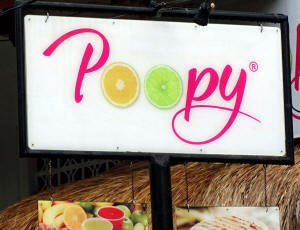
Poopies Juice Bar on Jl Bisma. I think they meant to put Poppies on the sign.
Fried crap. We saw this on a menu – I hope they meant fried crab.
Yoga Barn: (pet name the yogurt barn)
On the circuit for worldwide yoga enthusiasts. Classes $10 but they have free community classes 5:30-6:30 nightly. They have peaceful grounds, treatments and a restaurant (with the BEST organic buffet every Sunday 12-2 70,000r) First go to the free form dancing from 11-12:30. Lively, pulsing, with a quiet spiritual wind down. Clear the cobwebs then refuel on the buffet as you visit with new friends from around the globe! A great Sunday tradition.
Another Absolute Must:
Sari Organik:
Turn right up the hill about 200 meters past Cafe Lotus on the Main Road JL Raya in Ubud. Watch for small signs. At turn follow the small middle path which leads out into the rice fields. The 800 metre walk through the lush green fields is spectacular. Arriving at the open air restaurant you have your choice of fresh organic entrees and juices from their own farm. A couple good restaurants have popped up along the path also.
Dayu’s:
Sugriwa Street – one over from Haneman, great organic food. Large portions, unique recipes.
Bali Buda: Restaurant and health food store. Great food and juices – most comprehensive store in town. Bali Buddha down the Main Road, turn right, across from the Post Office. Great organic menu and small bakery and health food store. Another wonderful place to chill and hang out with like minded people. They deliver.
Down to Earth: A bit more pricey in the cafe and store but a good selection and may have what the other stores do not.
Alchemy Restaurant- Penestanan – up the hill from the Bridge, #0361971981 Best organic salad bar in town. Only 60,000r
Dewa’s Warung – JLGautama
Unfortunately the foreigners this visit have begun doing at Dewas what they wouldn’t dream of doing back home – smoking like chimneys right at the large shared tables, right while their table mates are eating. We gave up and found other smoke free environments. Too bad – great place. The best local food in town – friendly family run business. Fresh tasty food – over 20 vegetarian items. Say hi to Mama from us!! Try the fern with fresh coconut, rice and tempe with fresh tomato sauce – or any of the curries. You can eat the salad here. They have widened their place since 3 years ago. It’s fun to sit at one of 2 large tables with travelers from all over. One night we Hawaiians were sharing a meal with 2 girls from Sri Lanka, a couple from Germany, a woman from Australia, 2 girls from Hong Kong, a South African and a man from the Czech Republic. What more needs saying?
The Elephant Restaurant – great food, spectacular grounds, just past the bridge on the right side, going out of town .
Gauri’s Restaurant:
# 085 6319 3648 (Kadek also rents vans at a fair price)
Down the path on Sunset Lane off of Jl Bisma. Kadek, Dewi and Gauri are the young family who offer tasty food at a good price. Even when I was cooking we would stop by there for coconuts on our nightly walk through the rice fields.
We attended Kadek and Dewi’s wedding, met new baby Gauri, and then the blessing (Ula ping) of their newly renovated Restaurant. It’s fun to return to a place and renew connections.
Places to check out:
Don’t miss Campuhan Ridge!!!. Get a taxi to the top of the hiking road then path.(50,000tp from town) Total hiking time down about half an hour but take your time, enjoy the view, stop for a coconut, have a relaxing lunch, check out the temple at the bottom.
Monkey Forest Sanctuary: a must see. Those monkeys are real characters. 30,000 r p.p.
Bali Safari Park (Gianyar):
Long ago on a remote hillside, between the mountain and the sea, in Bali
lived a small village of people who loved Nature. They considered all the wild animals and plants to be their friends. With few people the tigers and other animals lived side by side in peace with the villagers. The 40 hectare park tries to relive this legend. About $40 p.p. so pricey but it was amazingly impressive considering how far from Africa it is!
When the taxi drivers or dance performance touts ask you to buy while walking down the street, just say: “Suda” already They seem satisfied without further discussion.
Jan bati – delicious
In case you were wondering why we have named our landlord Mr Ketut, and the man who gets our coconuts Coconut Ketut and Builder Ketut, and Sterling’s Ketut etc just read on:
Meaning of Balinese Name

BALINESE NAME
Basically the caste system in Bali are divided into 4 levels, which are:
1. Brahmana
This caste is for religious leaders (priest), the people who lead only the important religious ceremonies, and considered the highest caste among all. The names in Brahmana caste are :
Boys : Ida Bagus
Girls : Ida Ayu, Dayu
2. Ksatria
This caste includes the ruler (king), royal family member, and knights. The rulers live in Puri (castle) and implement a role in the state government and state defense. The royal family names in Ksatria caste are :
Boys : Anak Agung, Agung, Dewa
Girls : Anak Agung, Agung, Dewi, Dewayu,
Desak
There are also common middle names for the Ksatria caste, such as Raka (eldest child), Oka (last child), Rai (youngest sibling), Anom (young boys or Girls), Ngurah (powerful one). And if the child is born to the family member who rules in a Puri (the king), the names will be either Tjokorda (or Cokorda) or Dewa Agung.
3. Waisya
A long time ago this caste was filled with traders, business people. They were also usually landlords who had fields for whom the farmers worked. Their names include:
Name Boys/Girls : Ngakan, Kompyang, Sang or
Si
4. Sudra
This is the lowest caste and has population of more than 90% of Balinese. Originally this caste has profession as farmers or labors. But as time goes and modernization developed Bali, the Sudras can also have profession as managers, lawyers or doctors. The names for this caste are:
Firstborn : Wayan, Putu, Gede (for boys), Iluh
(for girls)
Second child : Made, Kadek, Nengah
Third child : Nyoman, Komang
Fourth child : Ketut
Fifth child and so on will go back to the first order, usually with middle name “Balik” to let people know, because “Balik” means to return. For example, the name I Wayan Balik Wiracana.
Another important naming in Bali that you must know are the callings for older man is Bli (read: blee), for older woman is Mbok. As for teenagers or those who are not married is Gus (read: Goos; short from Bagus or handsome) for boys, and Gék (short from Jegég or beautiful) for girls.
MAY I KNOW, WHAT IS YOUR BALINESE NAME??
The Balinese year is not 365 days. I’m not sure if exact but their year is approximately 228 days. Their birthday is on a different date each year.
Balinese birthday is coming every six months Balinese calendar which is every 7 months if we compare with common calendar. and yes, it’s not partying. mostly they do offering and praying. and having lunch or dinner together with family.

The tall offerings (Gebogan) with luscious fruits,
other foods and beautiful flowers being carried
to the temple. (Compliments of Ubud
Community).
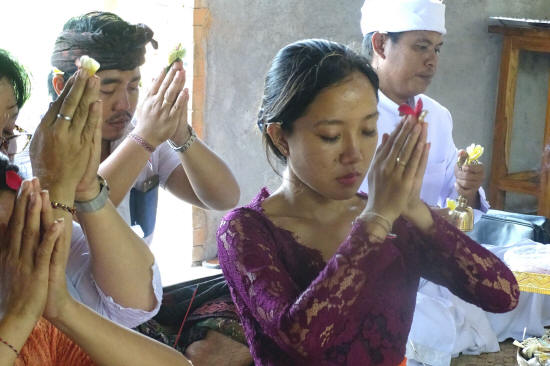
Every aspect of life in Bali is a ceremony.

Stories from the holy Hindu scriptures,
the Mahabharata, are played out
in Balinese dances.

Elaborate costumes.

On the Eve of Nyepi, Pengrupukan Ceremony is to
invite all the evil spirits to occupy the ogoh ogohs,
which are then burned.

A happy festival character.

We were fortunate to see the large temple at the
bridge decorated like a meringue cake

Every surface was decorated with flowers, bright
satin cloth, and intricately woven palm leaves.

Taking offerings to the temple.

Add brightly colored ceremony outfits and it
was a treat to the eyes.

Even the carvings were adorned for the occasion.
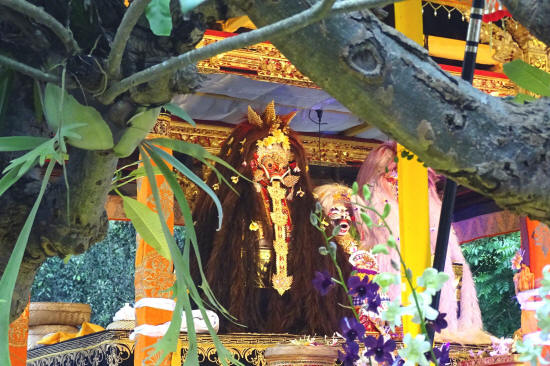
A decorative demon.

The women enjoy socializing in their bright
ceremonial outfits.

Offerings given to the gods.

The Elephant Cave, Goa Gajah.
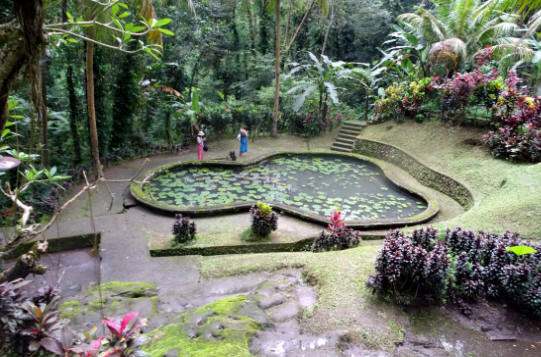
Beautiful gardens surround the Elephant Cave.
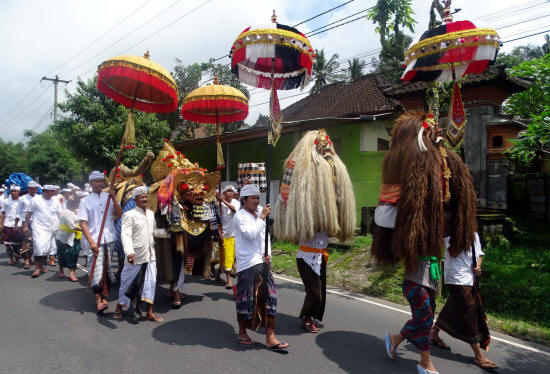
When driving in Bali there is always a
village ceremony.

Colorful Koi in the Water temple ponds.

Tirta Empul – Holy Spring. Devotees washing
away their impurities with the holy water.
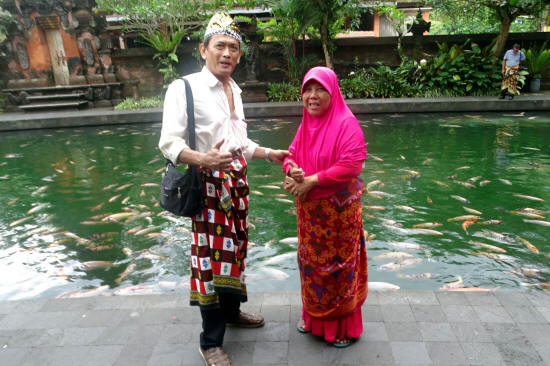
Javanese Muslims enjoying the Hindu temple.
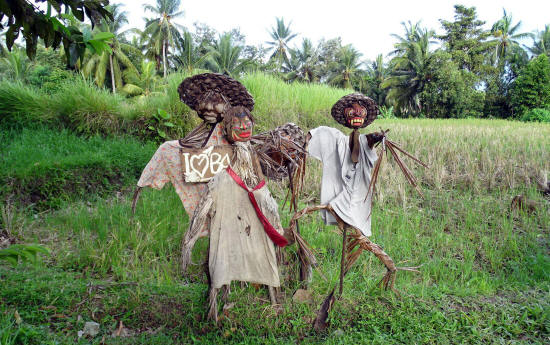
Creative scarecrows.

Vibrant lotus.

On ‘vehicle blessing day’ all cars and scooters
are decorated.
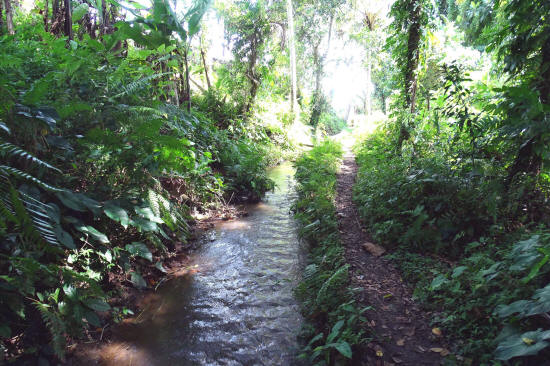
We love hiking miles and miles through the rice fields surrounding Ubud.
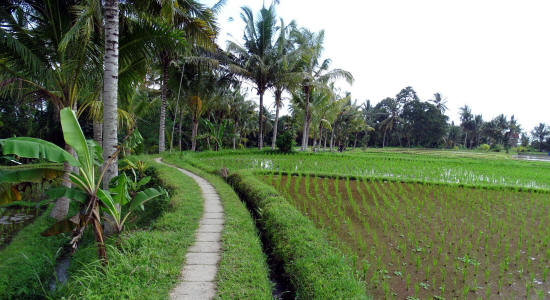
A narrow but paved path through the green
fields.
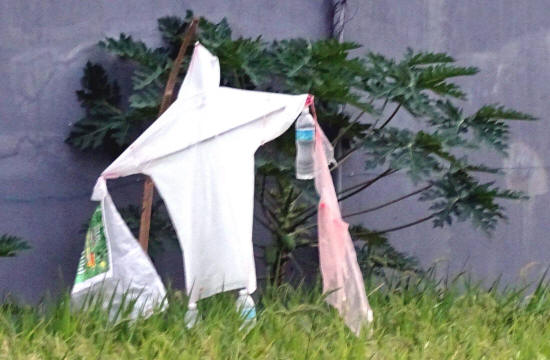
A scarecrow prepared for the rain.

When the rice is ripe the locals get very creative
with their scarecrows. Birds eat a large portion
of each crop.
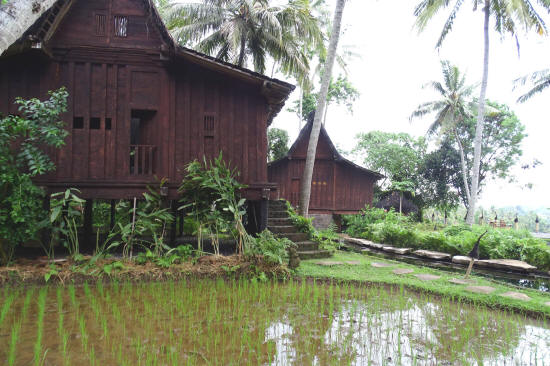
An old fashioned wooden house out in the fields.

A neighbor who lives in this tiny shack with his
wife for a few weeks each season. Easier to camp
out in the field than commute twice daily.

Stunning sunset.

The brilliant green of new rice.
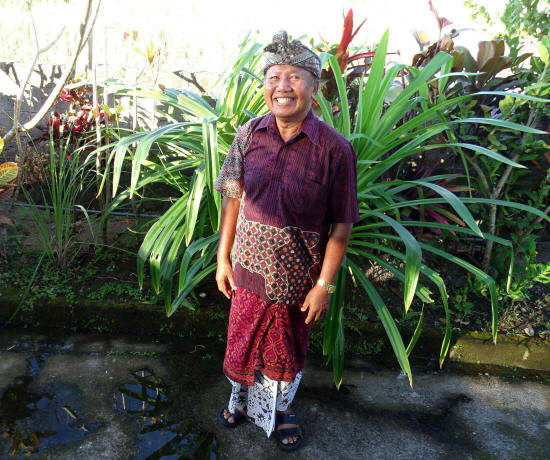
Our friend and landlord, Mr Ketut.

I made a flower offering every other day. Special
flowers are planted just to put in offerings.

Working on my container garden.
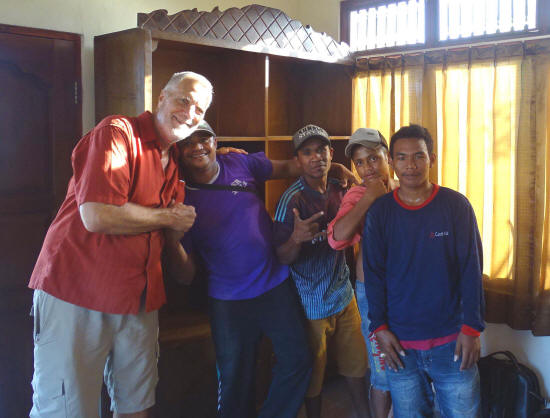
When you live 500 metres down a motorcycle path,
everything needs to be carried by bike or human power.
These guys carried our new heavy teak bookcase to our
house.

Artistic touches at every turn.
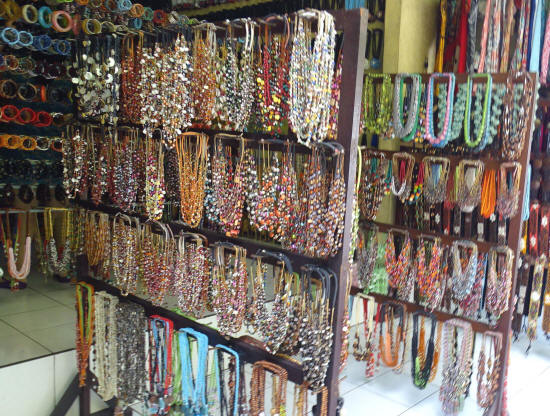
I love working with the ladies to make new
bead necklaces.

Neighbor Kadek and Dewi’s wedding.
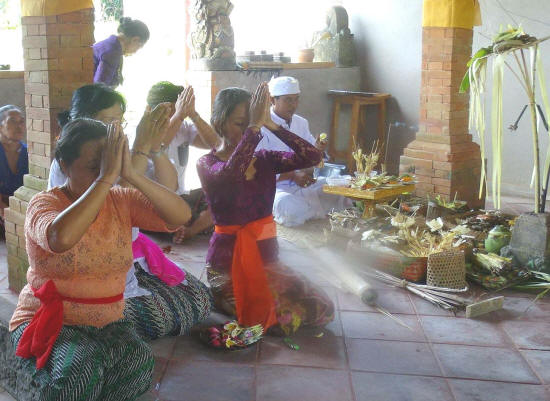
We attended Kadek and Dewi’s wedding, met new
baby Gauri, and then the blessing (Ula ping) of their
newly renovated Restaurant. It’s fun to return to a
place and renew connections.

Dinner with our dear friend Sterling. We have
lots of fun together in Ubud.
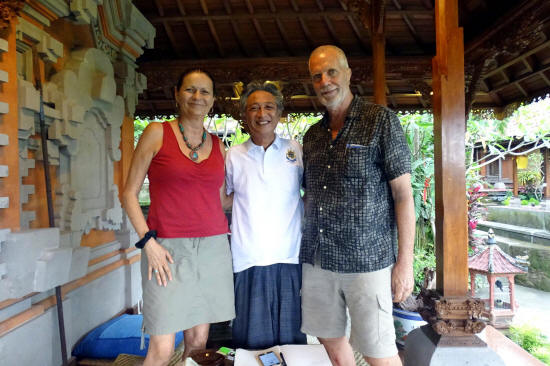
Discussing education with the King of Ubud.

